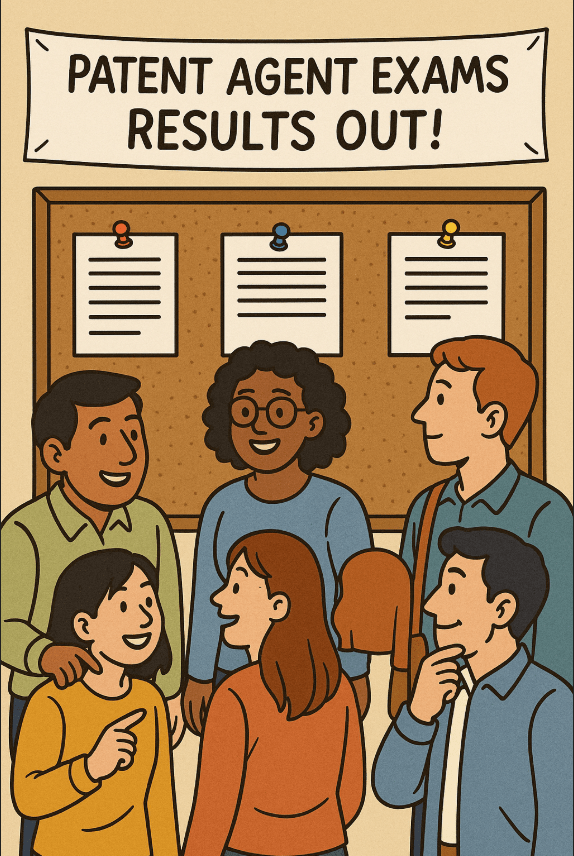Discussing an anomaly in the results of the Indian Patent Agent Exams, Rajiv Kumar Choudhary explains how viva voce played a determinative role in the results for some of the candidates, despite them securing the qualifying marks in Paper I and II. Rajiv is a practicing advocate based in New Delhi. He specialises in IP law, with a focus on high-technology and patent law. His core IP interest areas are the intersection of technology and IP, Indian IP policy, innovation, and telecommunications patents. His previous posts on the blog can be viewed here.

Analysing the Results of Patent Agent Exam 2025
By Rajiv Kumar Choudhary
The results of the patent agent exam were obtained from the patent office website and entered into a google sheets document. The complete sheet can be seen here. First raw data was obtained and then it was processed and sorted. Thereafter, it was separated as Qualified and Not-Qualified data. There were 183 NQ candidates of which 7 were absentees for the viva and hence their marks are not considered while conducting the analyses.
The Not-Qualified data was analysed further and it was found that there are at least 7 candidates who could not qualify the exam because the viva-voce marks became determinative even though the viva voce weight is limited to 25% of the Paper I and Paper II marks, i.e. 50 marks out of 200 total marks.
Analysis

The histograms show the distributions of total marks and the individual exam components. The distributions for ‘Paper I’ and ‘Paper- II’ are roughly bell-shaped after the 50 mark cut off (i.e. are normal distribution and as expected), while the ‘Viva- Voce’ distribution is skewed right, with most scores falling on the higher end. This shows that the viva-voce marks are entirely subjective.
It is reiterated that data is for only those who did not qualify. They have 50% marks in Paper I and II. One take away from this skew is that there are large number of candidates who lost because they were not able to get adequate marks in viva (which is why, one can see that about 15 candidates got 148 marks; 30 candidates got 146; about 25 candidates got 142, etc. That means that viva played a determinative role in their failure.
The variation between different centres is also stark with the Mumbai and Chennai centre awarding the least marks to the candidates as compared to New Delhi and Kolkata which gave comparatively more marks than other centres.
The variation in marks can be seen from the scatter charts for each of the exams below:
Viva-voce has the highest standard deviation followed by Paper I and then least in Paper II. This shows that Paper I and Paper II are objective and viva-voce is entirely subjective dependant on multiple factors. It is clarified that the scatter charts show the marks obtained by the candidates (out of 100 in paper 1, 2 and out of 50 in viva) vs total marks. So one can see that comparatively between paper 1 and paper 2, candidates have scored better in paper 1 than in paper 2. In viva, it is across the spectrum from lowest to highest.


My main analysis starts with those candidates who obtained the minimum marks in the viva and hence the sheet was sorted according to vice voce marks. Accordingly, I tried different ways in which I could I normalize the marks of candidates as there was a high(er) variance in the data in viva-voce marks, not just between centres but between candidates themselves.
In one method, the normalization marks are in Paper I and II are averaged and a weightage average of 50% of this average is taken to get to marks in viva-voce. These marks are then added to the Paper I and Paper II marks to obtain total marks.
Each of these 7 has more than / the required 60% marks in Paper I and Paper II but they were given less than 25 or 25 marks in the viva voce. Hence, these candidates should pass based on the law laid down in Anvita Singh vs. Union of India / RB Rampal vs Union of India (WP (C) 3333/2012): Viva marks cannot be determinative. But the exact opposite has happened here.

My overall view remains that either viva should be scrapped altogether or it should be normalized. There are multiple ways to normalize scores as is done by various agencies across the country.
Failing a professional exam, just because the examiner did not like the verbal answer, should not be a reason for anyone to fail. In this case, the problem is acute because the patent office does no business verbally: everything is documented, including asking agents to upload the documents post hearing.